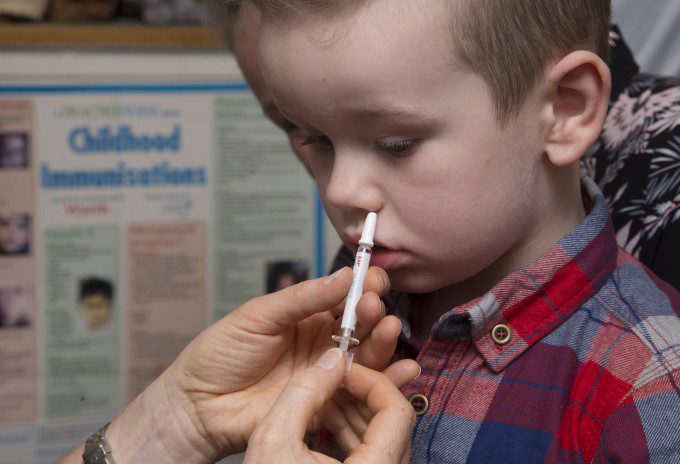Parents should get their children vaccinated against influenza now
Don’t let flu spoil your children’s Christmas holidays
As the festive period approaches, parents of two and three year-olds are being reminded to ensure their children are protected against flu.
Children aged two to eight years (on 31 August 2017) are eligible for a free flu vaccine in Wales, but this year uptake is low in children aged two and three, with only two in every five children in this age group currently protected.
Uptake of the nasal spray vaccine in primary school aged children has been good (almost 70 per cent), but stands at 40 per cent for children aged two and three years old.**
Young children are known to be very good at spreading germs and as families come together this festive season, it is recommended they have the vaccine to protect the whole family.
The flu vaccine is the single best way to protect against catching and spreading flu. The vaccine protects the child and also helps protect others too by reducing the spread of flu.
Influenza can affect people of all ages, and can be severe. Last winter in Wales, 671 children and adults were diagnosed with influenza in hospital, with 74 admitted to intensive care units.
For most healthy children, influenza can mean several miserable days at home in bed. However, parents should be aware that flu can sometimes result in serious complications, especially for very young children and those with long term health problems.
For two and three year old children the vaccine – which is a quick, safe and completely pain free nasal spray – will be given at their local GP surgery. If you have not heard from your GP, please contact them as soon as possible to make an appointment.
Jenny Israel, Head of Children’s Public Health Nursing, Hywel Dda University Health Board explains why it’s so important that eligible children receive the flu nasal spray vaccine.
She said, “We are encouraging children in the eligible groups to be vaccinated to prevent the spread of flu in schools and the wider community. Flu symptoms include fever, chills, headaches and aching muscles. In young children gastrointestinal symptoms such as vomiting and diarrhoea can also occur, and can lead to some children needing admission to hospital, which can be a frightening experience for the child and the parents. For those most at risk – the very young, vulnerable adults, pregnant women and the elderly, flu can be very serious. It can lead to serious illnesses such as bronchitis, otitis media (particularly in children), pneumonia; and in some cases meningitis and encephalitis, and even death.
“Children are super-spreaders of flu. Vaccinating children minimises the spread of flu to their family, within nurseries and schools, and in the general population, and so protects the most vulnerable from flu and its complications.”
Dr Richard Roberts, Head of the Vaccine Preventable Disease Programme at Public Health Wales, echoes what Dr Owen says: “The nasal spray vaccine provides very effective protection for children against influenza and it works best if given before flu starts to circulate.
“Vaccination helps protect individual children from flu and also can help stop it spreading to family, friends and the wider community.”
In addition to children between the ages of two to eight (age on 31 August 2017), other groups strongly advised to get vaccinated are pregnant women, individuals from six months of age with long term health conditions, people aged 65 and over and carers. Health and social care workers are also advised to have the flu vaccination to protect themselves and the people they care for.
Immunity wanes over time and each year the flu viruses that circulate and cause health problems can change so vaccines are also changed to match them. Getting an annual flu vaccine is the best way to protect yourself and others from catching or spreading influenza.
For further information visit www.beatflu.org or follow Beat Flu on Facebook and Twitter.
Dylai rhieni sicrhau bod eu plant yn cael brechiad rhag y ffliw nawr
Peidiwch â gadael i ffliw ddifetha gwyliau Nadolig eich plant chi
Wrth i dymor yr ŵyl nesáu, mae rhieni plant dwy a thair oed yn cael eu hatgoffa i warchod eu plant rhag y ffliw.
Mae plant dwy i wyth oed (oedran ar 31 Awst 2017) yn gymwys i gael brechiad y ffliw am ddim yng Nghymru ond eleni mae lefel isel o blant dwy a thair oed wedi cael y brechiad gyda dim ond dau allan o bob pump plentyn yn y grŵp oedran yma wedi cael eu gwarchod ar hyn o bryd.
Mae nifer da o blant mewn ysgolion cynradd wedi cael y brechiad (bron i 70 y cant) ond ar hyn o bryd mae’n 40 y cant** i blant dwy a thair oed.
Mae plant ifanc yn dda iawn am ledaenu germau ac wrth i deuluoedd ddod at ei gilydd dros y Nadolig, argymhellir eu bod yn cael y brechiad i warchod y teulu cyfan.
Brechiad y ffliw yw’r ffordd unigol orau o warchod rhag dal a lledaenu’r ffliw. Mae’r brechiad yn gwarchod y plentyn a hefyd yn helpu i warchod pobl eraill drwy leihau lledaeniad y ffliw.
Gall y ffliw effeithio ar bobl o bob oed a gall fod yn ddifrifol. Y gaeaf diwethaf yng Nghymru, cafodd 671 o blant ac oedolion ddiagnosis o’r ffliw mewn ysbyty gyda 74 wedi’u hanfon i unedau gofal dwys.
I’r rhan fwyaf o blant iach, gall y ffliw olygu sawl diwrnod diflas gartref yn y gwely. Ond dylai rhieni ddeall bod y ffliw’n gallu arwain at gymhlethdodau difrifol weithiau, yn enwedig i blant ifanc iawn a’r rhai sydd â phroblemau iechyd tymor hir.
I blant dwy a thair oed bydd y brechiad – sy’n gyflym, yn ddiogel ac yn gwbl ddi-boen ar ffurf chwistrell trwyn am ddim – yn cael ei roi yn y feddygfa. Os nad ydych chi wedi clywed gan eich meddyg teulu, cysylltwch â’r feddygfa cyn gynted â phosib i wneud apwyntiad.
Mae Jenny Israel, Pennaeth Nyrsio Iechyd Cyhoeddus– Plant, Bwrdd Iechyd Prifysgol Hywel Dda, yn egluro pam y mae mor bwysig i blant cymwys gael y brechlyn sydd ar ffurf chwistrell trwy’r trwyn.
Meddai, “Rydym yn annog plant mewn grwpiau cymwys i gael eu brechu er mwyn atal y ffliw rhag ymledu mewn ysgolion ac yn y gymuned ehangach. Mae symptomau’r ffliw yn cynnwys gwres, teimlo’n oer, cur pen a chyhyrau poenus. Gall plant ifanc hefyd ddioddef symptomau gastroberfeddol megis chwydu a dolur rhydd, a gall olygu bod angen i rai plant gael eu derbyn i’r ysbyty, sy’n gallu bod yn frawychus i’r plant a’r rhieni. Gall y ffliw fod yn ddifrifol iawn i’r sawl sy’n wynebu’r risg fwyaf, sef plant ifanc iawn, oedolion agored i niwed, menywod beichiog a phobl hŷn. Gall arwain at salwch difrifol megis broncitis, llid y glust ganol (yn enwedig ymhlith plant) a niwmonia, ac at lid yr ymennydd ac enseffalitis mewn rhai achosion, a gall ladd hyd yn oed.
“Mae plant yn dda iawn am ledu’r ffliw. Mae brechu plant yn lleihau’r graddau y mae’r ffliw yn ymledu yn eu teuluoedd, mewn meithrinfeydd ac ysgolion ac ymhlith y boblogaeth yn gyffredinol, ac mae felly’n amddiffyn y bobl fwyaf agored i niwed rhag y ffliw a’i gymhlethdodau.”
Mae Dr Richard Roberts, Pennaeth y Rhaglen Afiechydon Ataliadwy Trwy Frechu yn Iechyd Cyhoeddus Cymru, yn adleisio geiriau Dr Owen: “Mae’r brechiad drwy chwistrell trwyn yn rhoi gwarchodaeth effeithiol iawn i blant rhag y ffliw ac mae’n fwy effeithiol o’i roi cyn i’r ffliw ddechrau ymddangos.
“Mae brechu’n helpu i warchod plant unigol rhag y ffliw a hefyd mae’n gallu helpu gyda stopio ei ledaenu i deulu, ffrindiau a’r gymuned ehangach.”
Yn ychwanegol at blant rhwng dwy ac wyth oed (ar 31 Awst 2017), y grwpiau eraill yr argymhellir yn gryf eu bod yn cael eu brechu yw merched beichiog, unigolion o chwe mis oed sydd â chyflyrau iechyd tymor hir, pobl 65 oed a hŷn a gofalwyr. Hefyd cynghorir gweithwyr iechyd a gofal cymdeithasol i gael brechiad y ffliw i’w gwarchod eu hunain a’r bobl yn eu gofal.
Mae’r imiwnedd yn gwanio gydag amser a bob blwyddyn mae feirysau’r ffliw sydd yn yr aer ac yn achosi problemau iechyd yn newid felly mae brechiadau’n cael eu newid hefyd i gyfateb iddynt. Cael brechiad blynyddol y ffliw yw’r ffordd orau i warchod eich hun ac eraill rhag dal neu ledaenu’r ffliw.
Am fwy o wybodaeth ewch i www.curwchffliw.org neu dilynwch Curwch Ffliw ar Facebook a Twitter.
Help keep news FREE for our readers
Supporting your local community newspaper/online news outlet is crucial now more than ever. If you believe in independent journalism, then consider making a valuable contribution by making a one-time or monthly donation. We operate in rural areas where providing unbiased news can be challenging. Read More About Supporting The West Wales Chronicle






















